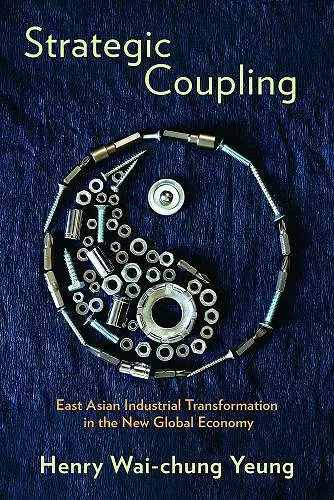Strategic Coupling
East Asian Industrial Transformation in the New Global Economy
Format:Hardback
Publisher:Cornell University Press
Published:24th May '16
Currently unavailable, and unfortunately no date known when it will be back
This hardback is available in another edition too:
- Paperback£34.00(9781501702563)

In Strategic Coupling, Henry Wai-chung Yeung examines economic development and state-firm relations in East Asia, focusing in particular on South Korea, Taiwan, and Singapore. As a result of the massive changes of the last twenty-five years, new explanations must be found for the economic success and industrial transformation in the region. State-assisted startups and incubator firms in East Asia have become major players in the manufacture of products with a global reach: Taiwan's Hon Hai Precision has assembled more than 500 million iPhones, for instance, and South Korea’s Samsung provides the iPhone’s semiconductor chips and retina displays.Drawing on extensive interviews with top executives and senior government officials, Yeung argues that since the late 1980s, many East Asian firms have outgrown their home states, and are no longer dependent on state support; as a result the developmental state has lost much of its capacity to steer and direct industrialization. We cannot read the performance of national firms as a direct outcome of state action. Yeung calls for a thorough renovation of the still-dominant view that states are the primary engine of industrial transformation. He stresses action by national firms and traces various global production networks to incorporate both firm-specific activities and the international political economy. He identifies two sets of dynamics in these national-global articulations known as strategic coupling: coevolution in the confluence of state, firm, and global production networks, and the various strategies pursued by East Asian firms to attain competitive positions in the global marketplace.
Henry Wai-chung Yeung's Strategic Coupling is timely to fill up the vacuum on East Asian develomentalism literature in the wake of globalization challenges since the 1990s. This much-needed exploration on the trajectory of post-developmentalism in South Korea, Taiwan, and Singapore, offers an empirically rich and theoretical cohesive account of three successful cases in coping with industrial transformation in the age of globalization.
* International Relations of the Asia-Pacific *Examines East Asian industrial transformation and strategic coupling in national global articulations, how East Asian firms have survived and competed since the 1900s without direct financial support from their domestic states, and the nature of state presence in the changing reconfiguration of state-firm relations.
* Journal of Economic Literature *An excellent overview of the developmental state literature and more recent empirical analyses that raise questions about this model both historically and in the last couple of decades.... Yeung's analysis brings together incisive and carefully documented explanations at the firm and industry level using these organizational concepts with a broader understanding of national economic policy, a combination not typically found in research on East Asian economic development.... Very suitable for courses in international business, organizational sociology, and economics that focus on firm strategies, organizational and industry change, the evolution of the world economy, and technology industries.
* H-Diplo *One of the many great merits of this book is that it brings together a rich amalgam of theory and empirical evidence to bear on the concept of the developmental state.... Through a rich empirical analysis the author illustrates the three distinct strategic coupling processes engaged by East Asian firms in the global electronics, semiconductor, shipbuilding, automobile and service industries since the early 1990s—namely, strategic partnerships, industrial marketspecialization and (re)positioning as global lead firms.... Yeung is a worthy heir to the likes of [Robert] Wade because he can legitimately claim to have made some original contributions of his own by addressing the debilitating state-centricity of the original thesis.... Magnificent.
* Regional Studies *An interesting study that augments the state-centric perspective of the developmental state model with a more nuanced view that highlights firm-level agency and the strategic potential of embedding into global value chains.
* Pacific Affai- Winner of Professor Henry Wai-chung Yeung has been awarded the 2017 Murchison Award for his 'pioneering publications in the field of globalization'. The award is given by the Royal Geographical Society (with the Institute of British Geographers). 2017
ISBN: 9781501702556
Dimensions: 229mm x 152mm x 27mm
Weight: 907g
312 pages